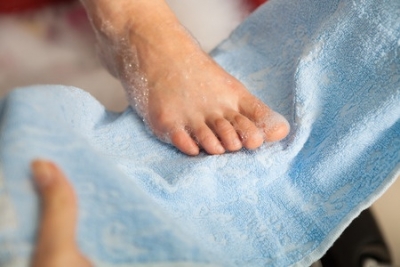Connect With Us
Blogs

Diabetic Foot Care (3)
At Superior Foot & Ankle Care, we want all of our Douglas Park/Los Angeles County area patients to be vigilant about good foot care. For patients with diabetes, however, this is even a more critical concern. Diabetes, also known as hyperglycemia, is a condition where blood sugar levels are not normal. If not properly controlled, the immune system can be compromised and infections difficult to heal. For your feet, the added complications commonly associated with diabetes—neuropathy (loss of sensation) and poor circulation can mean disastrous and debilitating results. This leaves diabetic patients at increased risk for several conditions, including fungal infections, ingrown nails, calluses, hammertoes, corns, and skin problems. You can, however, prevent damage from diabetes by taking some extra care with your feet and avoiding potential problem scenarios. Here are six ways to ensure good foot health if you have diabetes:
- Schedule regular appointments with our podiatrists, Victoria M. Foley and Dr. Constance Ornelas. The foot doctor will carefully monitor your feet for any changes that may signal an infection or ulcer forming. The podiatrist can also advise you on proper foot care and prescribe treatment for new or existing conditions.
- Develop a daily care regimen. Wash feet with warm—not hot—soapy water and dry thoroughly, particularly between your toes. While you clean your feet, look them over for signs of developing problems such as skin color changes, swelling, sores, cuts or blisters, bruises, and redness. Report anything suspicious to our Long Beach office immediately by calling: (562) 420-9800.
- Choose shoes wisely. Make sure they do not pinch or rub anywhere that can cause a Look for styles with a wide roomy toes box and soft leather uppers. Avoid high heels.
- Keep feet dry. Wear absorbent socks (with no seams or tight elastic bands) and change them as soon as you notice your feet feel damp. If your feet tend to sweat profusely, use an anti-fungal foot powder each morning to reduce the risk of athlete’s foot.
- Take care of toenails or let a professional handle. Nails should be trimmed straight across and not too short. File rough edges to prevent them from catching and tearing.
- Protect circulation by not smoking, changing position frequently and exercising regularly.
If you are diabetic and have more questions about how to best care for your feet, contact us today.
At Superior Foot & Ankle Care Center we treat many patients with diabetes. November is American Diabetes Month and a good opportunity for us to go over some care tactics for patients with this disease. Below are some key areas to focus on:
Your Daily Care Routine
Of course, a good foot care regimen is important for everyone, but for a diabetic patient, it is even more critical. Your daily care plan should include:
- Washing your feet with warm water and a mild soap
- Drying your feet completely, with extra care to ensure that the area between your toes is completely dry (this will help prevent fungal infections)
- Checking toenails for jagged edges. Always trim nails straight across with no rounded edges. Do not cut too short and never cut the corners.
- Inspect your feet from every angle. Look for changes in skin and nail color, rashes, flaking skin, bruises, swelling, any scratches or cuts. Report anything that concerns you to our podiatrists, Dr. Victoria Foley and Dr. Constance Omelas to evaluate. It’s always better to be over cautious!
Your Shoes and Socks
Shoes should have wide, roomy toe boxes and be made of soft, flexible materials. Avoid heels higher than 2 inches. When buying new shoes, have your foot professionally measured. Run your hand around the inside of the shoe to make sure there are no rough spots or loose stitching. Wear new shoes for only a few hours at a time and examine your feet after wearing to make sure there are no red spots or blisters forming.
Socks should be the type that wick moisture away from your feet. If you sweat excessively, change your socks multiple times throughout the day. Avoid socks that have overly tight elastic on the tops and those with seams across the toes.
Your Lifestyle Choices
Eating an appropriate diet to help manage your blood sugar is essential. A regular exercise routine will help you maintain a good weight and also improve circulation. Don’t smoke because it has a negative impact on circulation. Follow all of your doctor’s recommendations for keeping your diabetes under control.
If you have questions or concerns about diabetes and your feet, contact our Long Beach office today by calling: (562) 420-9800.
At Superior Foot & Ankle Care Center we know that diabetes doesn’t have to prevent you from living a full and active life. We treat many patients with this disease and we know it can have a big impact on the health of your feet. Diabetes impedes the circulatory and immune systems increasing the likelihood of infections and decreasing the body’s ability to heal. To make matters worse, neuropathy, a condition also commonly associated with diabetes, makes it difficult to perceive sensations like pain or heat which would signal a potential wound. The good news is there’s much you can do to protect your feet. In recognition of National Diabetes Awareness Month we’d like to focus on some particularly important areas:
Foot Care—Your feet can be both a recipient and an early warning system with regard to problems with diabetes. For that reason, inspecting your feet on a daily basis is essential. Changes in skin or nails, lumps, swelling, bruises, redness, blisters can all signal a potential problem developing. It’s critical that one of our foot doctors, Dr. Victoria Foley or Dr. Constance Omelas be informed of any unusual changes immediately. A good care regimen can also help decrease the risk of foot problems in diabetic patients. Wash feet with a mild soap in warm—not hot—water and dry completely, especially between your toes.
Shoes—Although well-made, properly fitted shoes can help reduce the risk of foot disorders in all patients, those with diabetes have specific concerns to address. Look for shoes that are well cushioned to reduce impact to the soles of your feet. Shoes should be laced and fit snugly (but not tight) to provide stability and limit side to side movement of the foot. If you have a toe deformity such as a bunion or hammertoe, special padding may be prescribed to prevent rubbing and friction which could lead to a corn or callus. Be sure the front of the shoe is roomy to prevent toes from being squeezed together.
Keep Feet Dry—Damp feet can lead to a fungal infection. If you tend to sweat profusely you can use a foot powder or even antiperspirant on the soles of your feet to reduce wetness. Change socks whenever you notice they are damp.
Healthy Lifestyle—Follow your doctor’s instructions for controlling your diabetes. Don’t smoke (it will further impede your circulation). Eat a healthy diet that is high in protein, vegetables and whole grains and limits saturated and trans fats and sugars. Exercise regularly for good joint health and weight control.
If you have additional questions about foot health and diabetes, contact our Long Beach office by calling: 562-420-9800.



